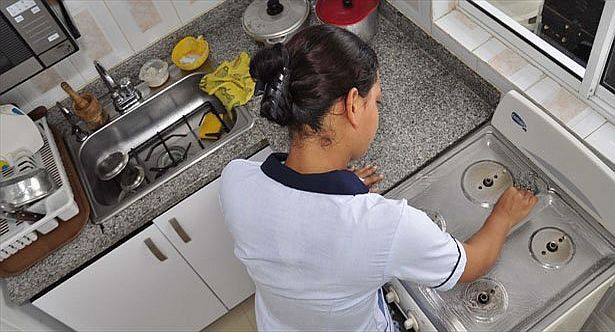To alleviate the consequences of the pandemic and inequalities in the sector, in September 2021 the national government launched the REGISTERED program, whose objectives are to mitigate labor informality, guarantee access to and permanence in a registered job and encourage bank access. What is the scope of the measure? Will you be able to meet your goals?
The impact of the pandemia
The pandemic strongly affected the sector. On the one hand, the working conditions of the workers worsened and, on the other hand, many of them lost their source of work.
Regarding the first aspect, during the Preventive and Compulsory Social Isolation (ASPO) stages, many women continued to work in homes exposed to the risk of contagion of COVID-19, even when their tasks did not involve caring for people (an activity declared essential in Argentina) . In health terms, these workers are mostly unprotected, since 70% do not access a social work.
In addition, those who maintained the employment relationship during the pandemic, complying with the law, had difficulty paying wages because most of the workers do not have a bank account.
Regarding the second aspect, activity fell sharply with the pandemic, the number of female workers decreased by 30% between the first quarter of 2021 and the same quarter of 2020. In turn, The high incidence of labor informality prevented access to compensation or unemployment insurance that generate a minimum income floor.
Domestic workers graphic ATENEA.jpg
REGISTERED program
It is a program for private house workers who work a minimum of 12 hours a week in the same home. It consists of an incentive for the formalization and permanence in employment where the State gives a fixed sum of money to the workers for 6 months, which is between 30% and 50% of salary, on account of the payment made by the employer. The money transfer is made in a salary account of Banco Nación, which is opened automatically and free of charge.
The employing party undertakes the obligation to pay the rest of the salary, register the worker in AFIP, make the contributions and contributions, and keep the job for 4 months after the end of the benefit.
Although the program is mainly based on the crisis in the sector in the context of the pandemic, it is not the first measure that is carried out through incentives to the employer. The main antecedent is found in Law No. 26,063 enacted in 2005, which allowed employers to deduct from Income Tax, wages and employer contributions.
Scope and limits of the REGISTRADA: the pending agenda
The success of the government in designing public policies that improve the situation of the sector after the harsh impact of the pandemic is noteworthy. However, it must be borne in mind that employer incentive programs only make sense if comprehensive public policies are developed and implemented that address all aspects of the problem.
A central axis that must be articulated with this type of program is state control. Generating innovative forms of inspection due to the impossibility of accessing households without the approval of the employer is a historical debt in the sector. Last October, a novel initiative of the Ministry of Labor of the Province of Buenos Aires was known, which carried out a series of control operations in private neighborhoods urging them to present the list of entry and exit of workers, in order to corroborate who are registered in the social security, respect the working day and the recognized rights.
They raise retirement contributions for domestic workers

It is also important to promote dissemination and awareness campaigns about the rights established in the law that establishes the Special Regime of Labor Contract for the Personnel of Private Houses and to strengthen the unions and associations of the sector. Generally, labor negotiations and the recognition of rights are hampered by the emotional bond between workers and employers. Therefore, that the workers know and defend their rights is fundamental.
So that the REGISTERED program it fulfills its objectives and is not a mere transfer of state resources, an active state is needed to articulate a battery of policies in the sector. This path is essential to improve working conditions and expand social protection for this group of workers who are the most affected by the crisis in the world of work.
Researcher at Atenea, Center for National Development Studies. Degree in Political Science, Specialist in Planning and Management of Social Policies and Master’s Degree in Social Policies (UBA).
Source From: Ambito




